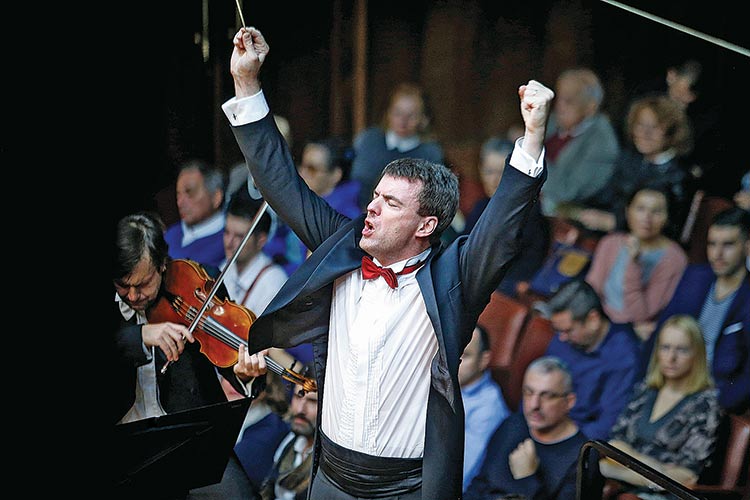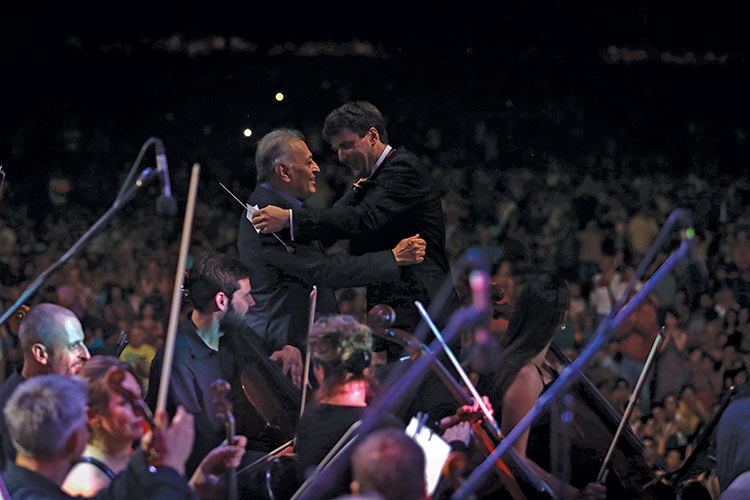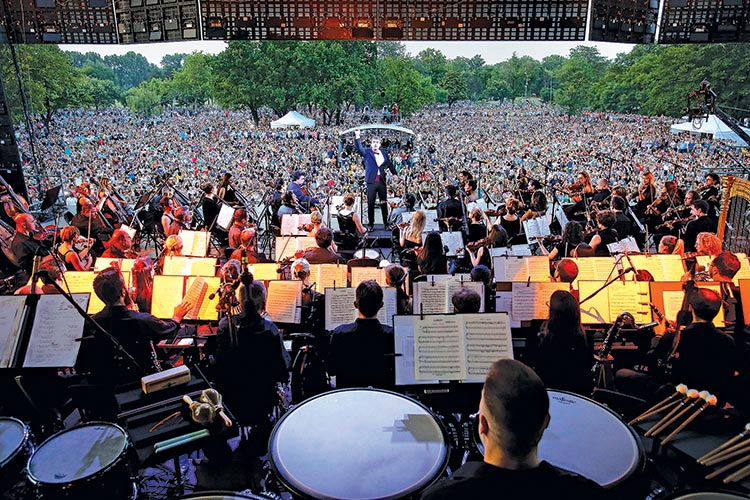He is ‘Generalmusikdirector’ of the Dortmund Opera and the Chief Conductor of the Dortmund Philharmonic Orchestra, while for the last five seasons he’s also been Chief Conductor of the Belgrade Philharmonic Orchestra. Born and raised in the then East Berlin, he gained a good musical education, completing his studies in departments for conducting and piano. In this interview for CorD, he explains why he gave preference to the conducting baton rather than tickling the ivories, how the Belgrade Phil became an important chapter in his career, what was the greatest professional compliment he’s ever received, how the former East and West Germanys differ today, how we were hit by the pandemic and much more…
Gabriel Feltz (50) is among those foreigners who’ve recognised the passion that characterises Belgrade’s artists, primarily the members of the Belgrade Philharmonic Orchestra, with whom he began collaborating for the 2017/2018 season. With his arrival came the feeling of a new breath of fresh air that has been blowing through this orchestra in recent years, and he quickly became a favourite of the Belgrade audience.
Who is this conductor, who graduated from the Hanns Eisler Academy of Music in Berlin and has conducted leading orchestras in Germany and abroad, and who led the Belgrade Philharmonic Orchestra in the Serbian capital when it performed the largest open-air concert of classical music in the country’s history, attended by 30,000 people? This interview is really an attempt to better acquaint CorD readers with this top conductor.
Describe the family in which you grew up – your father, a music pedagogue, and your mother. What do you recall of your earliest childhood?
I grew up in a classic family of musicians. My father was a string teacher. When I was between the ages of four and 12, he taught at the Hanns Eisler music conservatory in East Berlin, in the divided city. But my father always taught at home, because there weren’t enough classrooms at the conservatory. So, I grew up with a lot of sound around me – violin concertos, violin sonatas and so on. Even now, I sometimes have the feeling “I know that piece, I’ve heard it before” when something is playing on the radio in the car or when somebody is practising. That is a somewhat strange feeling. He also pushed me to start playing the violin and I didn’t want to, absolutely not! I fought against it like crazy at five or six years of age, then started later with the piano.

My mother is a costume designer and is still working a little bit, at more than 70 years of age, which I admire a lot. She was also a gorgeous painter and worked in a small chamber in our flat in Berlin. A ridiculously small space, really under pressure regarding physical space. She was very brave and travelled a lot, because she worked as a costume designer for all the small theatres in the repertoire system of the former DDR. And because my parents had no car, she would always travel by train, which of course took up a lot of time. She spent many days, months and years on the train.
How would you describe living and growing up in East Berlin in the 1970s and 1980s, before the fall of the Berlin Wall?
At the time between 1981 and 1989, with the change of the system coming, only that last year was very tricky for many people. As for my childhood in the years before, I didn’t really feel the influence of the political system. My life as a boy and a teenager was pretty normal, I would say. Of course, there was a lot of music and a big influence of the arts, that was the good side. East Berlin had a huge intellectual scene, really like a club scene with a lot of very well-connected people: directors of drama and opera, singers, chamber musicians, conductors, orchestra musicians, concert masters. They were all connected in a more traditional way of real communication, eye-to-eye and intensely in discussion about art.
For me, this was a highly creative place where I could learn a lot. I also attended a lot of concerts. Many orchestras came to Berlin on their tours, as well as orchestras from the West. For an upcoming musician who wanted to learn, East Berlin was not the worst place to be.
East Berlin had a huge intellectual scene, really like a club scene with a lot of very well-connected people
Did you take a piece of the wall to keep as a memento of the first 18 years of your life?
No, I was never interested in any kind of holy objects, like the relics of the Catholic Church. This was not important for me. I was happy when the city was reunited. I was an eyewitness of that magical night when people were dancing in the streets and on their cars at the Berlin Zoological Garden. I will never forget that. However, for my future and my professional career, I was really focused on my new chance to work across the entire country, which I then did. I have now been working for a long time in the western part of Germany, and that was only possible with the breaking down of the wall.
How would you describe the differences between the former East and West Germanys today, 30 years after the fall of the Berlin Wall?
Well, this is a very intellectual and political question, because if you look at the results of elections, we have quite different behaviour and different waves of interest between East and West. I appreciate the East Germans a lot. This is, of course, easy for me to say, as I am also an East German myself. I understand their mind and think they’re trying to save some of our traditions, which is not bad in my opinion. At the moment, the East Germans seem more traditional to me than the West Germans.

But this question also points out one of Germany’s big problems, because after such a long time, more than 30 years after the fall of the Berlin Wall, we are still making this difference between East and West. It is now urgent for us to say that we are all German and that is it. It is really a political problem that we always have this divided system. We need to overcome this now.
You studied piano simultaneously, yet still became a conductor. Why?
Orchestral music has always been more interesting for me than piano music. I’ve always been fascinated by the sound colours of the orchestra, and also a professional pianist has to practise like crazy. He is only happy when he is in a room with his instrument, a light and maybe a window, which to me seems like isolation, like a prison. By contrast, a conductor has got real people around him. He has the chance to communicate, to talk about music, to focus on people, to look at them, to feel them physically, to feel how they make music. It is an entirely different job. I would not like to live like a pianist. They pay a lifelong price for their practising in isolation. You also pay a high price as a conductor, but it is not as brutal.
After such a long time, more than 30 years after the fall of the Berlin Wall, we are still differentiating between East and West
As a student, which great conductor did you like and why? Who would you single out as the greatest today? What sets a great conductor apart from the rest?
As a child, and even now as an adult, I have admired Wilhelm Furtwängler the most, because he has been someone truly special in the traditional German repertoire. His legendary recordings are always so spontaneous and fresh.
His influence on music and his instinct to create something in the concert have really been at the highest level. Of course, I also admire Herbert von Karajan and Leonard Bernstein, who were universal conductors in a way. Both were very talented and very broad in their repertoires – fantastic in operas and also in symphonies.

Sergiu Celibidache was a Romanian who came to Germany and saved the Berlin Philharmonic after World War II, stepping up from student status to become chief conductor of the Berlin Philharmonic. He was a genius! I observed him a lot in master-classes, concerts and rehearsals. And, last but not least, I have to mention Carlos Kleiber, as every conductor all over the planet would probably do. Kleiber was the hidden genius of our business. He conducted only a few times, his repertoire was very small, but every concert and every opera performance by Kleiber was like a feast. They now look like perfect events: perfect conditions and a perfect result.
A good conductor has a strong personality that enables him to create something special with the score, while at the same time being a servant of the music. That’s what all those people did in a very brave and very compelling way, and this is the most important thing. And here comes the negative message: at present, I do not see any conductor – including myself – as being at the same level as those men.
It is safe to say today that the Belgrade Philharmonic has a significant place in your career. What is it that makes it special compared to other places where you’ve worked, and still work today?
The Belgrade Philharmonic (BGF) and me, that’s a long story! I can’t tell you everything now, because that would fill a book. But it is like in private life: sometimes you meet someone and immediately have a special feeling about them. My adventure with the BGF started with the only time that I’ve been arrested, and that happened at the airport. Back in 2009, there were complicated travel regulations that I wasn’t familiar with, so I forgot my passport and was travelling only with my German ID card. I was therefore arrested and detained at Belgrade Airport for two hours. I will never forget that! After those two hours, they put me on the next flight back to Munich. Arriving in the middle of the night, I then had to make my way to Stuttgart, where I was living at the time, and then ,at 5am the next morning, I started the whole journey again – this time with my passport. I probably didn’t sleep at all that night.
The next day, we started rehearsing Mahler’s sixth symphony, which is a tremendously difficult piece that’s an hour and a half long. However, despite all the trouble and delays, the orchestra and I immediately had a great start, totally free and with good chemistry between us. Our first concert together was great! In 2017, I was announced as the Chief Conductor of the BGF. In the eight years between those two, I’d only been back to Belgrade three or four times, which is not that much, but it had always been a good week, a good combination of work and music, and I liked the audience and the orchestra.
I was slightly surprised when they made me their Chief Conductor, but I was also very glad, because I now have more opportunities to conduct this wonderful orchestra. We then started to work a lot, with many rehearsals and a new repertoire for the orchestra. The BGF is now an important chapter in my life, and it occupies a lot of time and focus every year, for the city and for the orchestra.
A good conductor has a strong personality that enables him to create something special with the score, while at the same time being a servant of the music
Apart from being pianists, what do you and Belgrade Philharmonic Director Ivan Tasovac have in common?
Ivan Tasovac is a special artist, because he has been the General Manager of the BGF for a long time. He studied piano in Moscow and still plays excellently, so I appreciate him very much as an artist and a colleague. He has brilliant ideas for the orchestra’s marketing situation, and for new concerts and concert programmes. I think he’s the most important reason the orchestra has become an absolute highlight for everyone in Belgrade. The entire population of the city know the orchestra. For me, he is a friend and a colleague, and we work very well together.
Have you ever experienced conducting in front of 30,000 people like you did at the Belgrade Philharmonic’s open-air concerts a few years ago?
The first open-air concert in 2017 had two conductors, Zubin Mehta and me. Of course, that was a totally memorable moment that I will never forget: working together with that world-class conductor and the orchestra being so motivated and brilliant. The year after, I conducted the concert alone, but there were again 30,000 people, or even more. And it is really special for a conductor to have all those people at your back. Twenty years earlier, I conducted an open-air concert in Brazil with nearly 7,000 spectators, but Belgrade holds the record as the place with the most people in the audience.
You recorded your first joint CD with the Belgrade Philharmonic for German record label Dreyer Gaido, presenting your take on Reinhold Glière’s monumental symphony Ilya Muromets.
I’m proud that Glière’s work is on our first joint release. This is a great chance for the orchestra, because the record label we’re recording for is excellently represented on both the American and Japanese markets.
Critics have already rated this CD very highly, and the recording of Glière’s symphony represents a great reinvigorating of the market.
You’ve conducted in the East and the West. What would you say are the differences between that which is referred to as eastern and western music culture? Are those differences less pronounced today than they used to be?
For me, as a musician and as a private person who is interested in and observing society, I see a technological difference. Let me try to describe this. In the West, including western Germany, the influence of industrial progress on society is more visible than it is in the East. The East is slower when it comes to industrial products, computer technology, social media and so on, because of the time prior to 1989 that we refer to as the Cold War. We can feel and observe that even 30 years later, but I think this is a good thing!
The intellectual level in Eastern Europe seems to have been very high in my eyes, and this has resulted in all these countries having brought forth a whole generation of brilliant musicians. Just think of Sviatoslav Richter, Emil Gilels, Mstislav Rostropovitch, Galina Vishnevskaya, David Oistrakh and many others. I could cite hundreds of names here!
Your favourite composer is Sergei Rachmaninoff. How would you explain to a layperson, and to a music enthusiast, why he is so special for one of the world’s leading conductors?
Firstly, I am not one of the world’s leading conductors, but thank you for the compliment. Secondly, Rachmaninoff is not my favourite composer. I don’t have any favourite composers, because I try to conduct many different composers and the piece I’m working on at any given moment is then my favourite. Last week I conducted Bartók, so he was my personal god then. I tried to sneak into Bartók’s head, into his heart and brain, to understand more of him.

I’m fighting for Rachmaninoff because he was a total genius as a composer, as a pianist, and as a conductor. I love his music a lot, that is true, and we have too many judgements about his person, about his melodies. There is this prejudice saying that his music was second-class music. That’s what I don’t like and fight against. He is one of the greatest traditional Russian composers and he stands in the front row alongside Prokofiev, Shostakovich, Tchaikovsky and Mussorgsky. His three symphonies are played much more often today than they were 20 or 30 years ago, and maybe this is also slightly due to my influence as a conductor. I’m really proud of that.
Stravinsky and Shostakovich met long ago in the U.S.. Shostakovich was a shy person, but he admired Stravinsky a lot. These two great composers couldn’t find a way to talk to each other. They were sitting there, but nothing happened. It was a wonderful chance for Shostakovich, who was kind of “locked up” in the Soviet Union, to have a nice conversation with his Jewish American colleague, but both remained silent. They were like dogs, staring at each other. They agreed only in that one point that Puccini had written terrible music and that they both hated him. And even though I love and admire Shostakovich and Stravinsky a lot, I would have stood up and said: “Excuse me, gentlemen, you are totally wrong.” Like Rachmaninoff, Puccini is in the front row with all the great composers. And this is why I fight so passionately for Rachmaninoff and his music.
In the West, including western Germany, the influence of industrial progress on society is more visible than it is in the East
What do you remember as being the best critique of your work that has been spoken and/or written?
I remember one moment after a concert in Osaka (Japan) in 2017. The programme consisted of the Symphonies No. 4 and No. 8 (“The Unfinished”) by Franz Schubert and Richard Strauss’s “Last Four Songs” and “Death and Transfiguration”. I had proposed this programme to the Osaka Philharmonic Orchestra and the concert proved very successful. Of course, the “Unfinished” by Schubert is one of the most popular pieces in the classical repertoire, which makes it difficult to turn into a special and genuinely touching performance.
The piece is not difficult to play for the orchestra, but I worked towards finding that sensitive ghost of Schubert’s “dream soul”, to gain a more intimate feeling and an insight into his rather mysterious personality. After the concert, a Japanese viola player who’d been working on solo viola positions in German orchestras approached me. She had been listening to the symphony – which she herself must have played about 80 to 100 times – and said:
“I was crying because of how you interpreted this symphony”. That was something really true and naturally convincing, so I took that as a real compliment.

The COVID pandemic has closed concert halls around the world. Still, do you think that musical life could be slowly returning to the stage? What did you do when you didn’t have concerts and weren’t conducting?
Of course, we are all hoping that concert life will soon return to the stage. We need that urgently! We need situations where people come together in person, not only for cultural events, but also in the beer gardens, in restaurants and cafeterias, on the street, in the shops. Society is sick of isolation, of home offices and Zoom meetings. I don’t believe it would be a good future if we accepted all of this as our normal life and our normal way of communicating, because it makes a difference if someone is around you and you can look each other in the eyes or if you communicate through a screen.
The coronavirus pandemic is absolutely terrible and has damaged the section of culture as a whole, maybe even more than any other sector.
My thoughts really go to all the freelancers in music and in the arts, because in this regard I really can’t complain at all. That would be totally unfair, because I’m in a fixed payment situation and can work with both of my orchestras (the Belgrade and Dortmund philharmonics) and have even had some guest engagements. The 2020/21 season has been almost a regular season for me.
I’ve so far conducted at least 38 concerts and two opera productions, which at the moment seems like heaven for a conductor. I believe that many colleagues are jealous of this – at least I would be if I were a freelance conductor and had to sit at home. I’m not talking about this in this interview to make people feel jealous, but rather to express how grateful I am and how well I understand the situation of many of my colleagues.
In the time when I was frustrated by the coronavirus, because I couldn’t travel as usual or do the things I like to do, but rather was locked in my home, I – like most people – discovered that sports and physical activities helped the soul to overcome distress and handle frustration regarding the whole situation. But, again, my situation really was a good one.